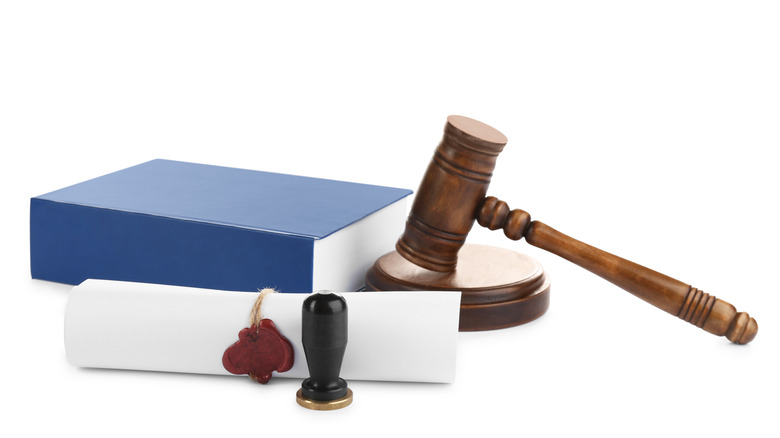What's The Difference Between A Will And A Trust?
Preparing your affairs for the inevitability of your passing is an important way to make sure that estate and other assets go where — and to whom — you'd like them to go. There are two main ways you can legally pass finances, assets, or possessions on to another person or association and that is by creating a will or a trust. Without the use of one or both of these legal documents, it would be left up to the laws of the state where the individual resided to see who their estate would pass on to. Usually, the decision would be made to pass the estate on to the spouse or blood relatives unless there are more specific instructions.
A will is a legally written document that states who's to inherit a person's assets or estate upon their death. This document is usually drawn up by a lawyer and then signed by the individual in question. The wishes contained in the will are not to be executed until the person dies. Trust, however, can have a few more options within it and can come into effect while the person is still alive. So let's take a look at the specifics of a will and a trust, how they differ from each other, and how you can tell which one is right for you in your own situation.
What makes a will different from a trust?
A will and a trust have a lot of the same properties, however, there are a few differences that make either one ideal depending on your personal situation. With regard to a will, it's a simplified document that allows you to name an executor to your estate in order to handle your affairs after you pass. This document can also specifically name who will take care of your children or pets, where and to whom your assets will be distributed, and detail your final wishes — in particular, what you'd like to happen to your remains. A trust can be a more detailed record with more focus on where, and especially when, all the assets that have been placed in the trust will be divided.
Of the two options, there's not one that's particularly more beneficial than the other. Both are legally binding documents and can make the allocation of assets clear so that there are no discrepancies about ownership after you die. However, one clear advantage to having trust over a will is that, unlike a will, your trust will not go through a probate process. The probate process begins after the individual has passed and is meant to verify the validity of the will and executor so that the terms of the will can then proceed. This process can be time-consuming and possibly add extra expenses as well.
Living will explained
A will is a written document that's made by an individual and specifies the allocation of certain personal and real properties in the event of the person's death. This document should include the individual's full name, and language that they're signing it of their own free will. Then, in detail, it must list the various real and personal properties and who they should go to. This can include homes, furniture, photos, and money, for instance. A will should also name the executor of the estate so that the person in question can be the conduit for the will to be carried out.
A will can also name guardians to your children and also your pets so that they will be taken care of once you've passed on. If you're a business owner, a will can also be helpful to pass along any stock, assets, or money associated with it. Finally, to make the will complete, it needs to be signed by the testator of the will as well as a witness or even two witnesses who will not benefit from the will. This important document should be kept in a secure place, such as a safe at home or with your lawyer, so that it can be properly presented and passed on to your executor after you die.
Living trust explained
A trust on the other hand can be created along with a will and is a legal document that stipulates money or assets that are held within the trust for individuals. In this case, a settlor — who is the person who initiates the trust in question — appoints certain trustees — who are the individual or persons who oversee and take care of the trust — and lays out what assets, income, or other properties are to be included in the said trust. The trust would stipulate the beneficiaries — who are the people who would benefit from the trust — and detail what assets or income they're to receive.
As opposed to a will where the actions are carried out after the testator has died, a trust must have the income or assets in it right away and in some cases, the income can be drawn while the settlor is still living. This is one of the many benefits of setting up a trust as you can witness how it's being handled while you're still alive.
Also, because a trust is so detail-oriented it can avoid going through the probate process, which will save time and expenses upon the settlor's death. This type of estate planning can be ideal for those who have plenty of assets and income to look after and want to avoid any discrepancies that may occur when it comes time to deal with the details of their life.



